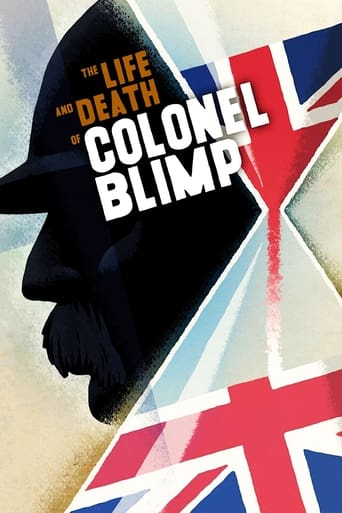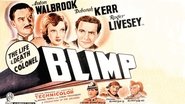cmayerle-41064
So much so that I wonder if George Stevens watched this movie more than a few times. The plots are quite different, but they're both stories of the adult lives of men whose genuine greatness isn't really revealed until the end. It also amazes me that this was filmed during WWII with references to real battles.Powell is one of those forgotten directors of yesteryear but his films are enjoyable, right down to how he does the credits. And he wasn't afraid to poke fun at stereotypical British-ness. This film is in turns mildly humorous, sentimental, a little philosophical, but mostly a character study. Deborah Kerr plays three separate roles-maybe her best acting, certainly my favorite movie of hers.
tomgillespie2002
Colonel Blimp started life as a satirical cartoon for the London Evening Standard by Sir David Low. An ageing, plump, pompous and eternally red-faced blowhard, Blimp was Low's idea of the militaristic upper-classes; the kind of chest-puffing Jingo who would voice his frequently contradictory declarations from a Turkish bath wearing nothing but a towel. At first, it would seem that Michael Powell and Emeric Pressburger's The Life and Death of Colonel Blimp is directly adapting the political cartoons, as the old man Colonel is rudely disturbed from his sleep in a Turkish bath by a group of youngsters who have arrived early for a planned war game, to declare that such chivalry in war will not be practised by the enemy. We then go back 40 years, and any hint of satire makes way for a story of romance, friendship, and growing old.During the Boer War in 1902, the young Clive Candy (Roger Livesey) receives a letter from Edith Hunter (Deborah Kerr) in Berlin, who warns him that a known rogue named Kaunitz is spreading anti-British propaganda. Going against orders, Candy travels to Germany and ends up causing a scene by provoking Kaunitz. To settle matters, a duel is arranged with a randomly-chosen German officer, who turns out to be Theo Kretschmar-Schuldorff (Anton Walbrook). While recovering from their wounds in a military hospital, the two men hit it off and begin a friendship that will last for more than 40 years. Moving through the First and Second World Wars, we follow Candy as he rises through the military ranks, fails and succeeds in love, before finding himself an old man, greatly outdated and socially displaced.It's astonishing that this film got made at all. On top of being rather experimental in terms of tone and narrative structure (it feels very much like the English equivalent of Citizen Kane), Colonel Blimp was shot in glorious - and expensive - Technicolor during wartime, running at almost three hours when most films wouldn't dare to push 100 minutes. Winston Churchill tried to ban it, believing it to be an anti-war propaganda piece poking fun at the idea of 'British-ness', when it is anything but. Instead, the film deliberately gives out mixed signals, lovingly embracing the idea of gentlemanly conduct during a bloody war, while pondering the necessity of brutality, especially when faced with an enemy who play like the Nazis did (and were doing at the time, of course). While British propaganda was making sure to send a clear and strong message about the enemy, Colonel Blimp makes one of its main characters a sympathetic German, and is clear to highlight that these nations will be friends again in the future.Livesey is staggering as Candy (who later becomes Wynne-Candy). The make-up work is absolutely flawless, easily trumping the big Hollywood productions we get these days. The man genuinely ages before our eyes, and Livesey manages to entirely convince as a man gaining experience and weariness through the years. He may be a man whose values are slowly becoming obsolete, but he remains a good man, and a thoroughly lovable one. Walbrook delivers an understated performance, and brings a tear to the eye during a monologue in which tries to convince British officials why they shouldn't deport him back to Nazi Germany, and Kerr juggles three roles - as Candy's lost love Edith; his wife Barbara; and his driver 'Johnny' in his later years - with absolute ease. It has remarkable scope yet is incredibly intimate, and it's a film that should have been branded across every cinema screen in the country by the War Office. Quite possibly the finest film ever to emerge from our rainy shores.
avik-basu1889
My first experience of a Powell-Pressburger film was 'Black Narcissus'. There were certain elements in it that I admired, but overall it left me a bit underwhelmed. So 'The Life and Death of Colonel Blimp' was my second bite of the cherry and I was completely blown away. It is very loosely based on a cartoon character called Colonel Blimp by cartoonist David Low. This character in the cartoons represented the old and the outdated elements of English society. Blimp with his big moustache was arrogant, naive, pompous and out of touch with the rest of the world due to his reluctance to change and let go of his outdated ideals. Although there is no character called Blimp in the film, but the main character of Clive Candy is the one who is supposed to be the figurative Blimp in the story. When the film begins we see Candy with the Blimp-esque moustache in all his overbearing and obnoxious 'glory'. He verbally bashes a younger officer named Spud for showing initiative and doing something out of the book instead of sticking to the rules. But Powell and Pressburger subsequently over the course of the film show us the real man beneath the moustache and his life through flashbacks of significant phases of his past which involve his involvement in the Boer War, WW1 and then ending with the WW2.I read Roger Ebert's review for the film and I have to say that he was at his analytical best while reviewing the film. Although the rift between the young and the old is very quickly established in the film and the viewer will certainly find some lack of logic and prudence in the ideals upheld so strongly by Clive Candy and the old guard, but Ebert correctly states that Powell and Pressburger in the film are actually defending the old. They are doing it not by blaming the new, but by actually trying to understand the old which in this case is the character of Clive Candy. Powell and Pressburger took a cartoon character that was supposed to be mocked and actually treated him with respect and genuine sympathy. The humanism that richly ornaments every minute of this film is very Renoir-esque. This film certainly is a bit of a tribute to a fading era where gentleman ship, courtesy, kindness and chivalry were never eclipsed by ruthlessness. Candy belongs to the era where more time was spent in a round table conference negotiating the rules and the code of honour to be maintained in the battle than the battle itself. The politics in the film can be perceived to be a bit too sentimental and pro-British, but even then the sentimentality gets conveyed in most innocent and adorable manner. But there is one aspect of the film which makes me amazed that this was a film that was released in 1943. That aspect is the way Powell and Pressburger deals with the character of Theo Kretschmar-Schuldorff. By going against all the conventions of propaganda cinema of the time, they actually made Theo a likable, honorable German soldier who becomes the most loving friend of Candy.Another very important theme explored in the film is the change that takes place in a character with age. During flashbacks we see that Candy himself was also quite the hot-blooded young man who didn't hesitate to disobey the orders of his superiors when he felt necessary exactly like Spud. But with time he became the old man who stuck to the rules and had an undying belief in playing fair. Maybe Spud sees a reflection of his future self in Candy. The sight of the old Candy in the midst of the younger generation reminded me of that scene in 'Once Upon a Time in America' where the old, grey haired Noodles looks at the young teenagers enjoying themselves as they pass him by on the road in their car.Now let's come to the acting. Roger Livesey's performance in this film is one of the best performances that I have ever seen. This might seem to be a bit of a over-the-top comment, but I have no hesitation in making this statement. He is an absolute dynamite and yet very nuanced in every scene and plays Candy with the utmost confidence. We see him play the young, the middle aged and then the old Candy. He becomes the character and is believable in every scene. Deborah Kerr plays three different roles. I think these three characters were meant to show the changing roles of women in society with the passage of time. Kerr also like Livesey brings a lot of subtlety to distinguish each of her characters from the other. Anton Walbrook who plays Theo just exudes charm and you can't help but love him and love his friendship with Candy.Like 'Black Narcissus', the cinematography is again brilliant in vibrant Technicolor. Some of the camera movements which Powell used were beautiful and so ahead of its time. Pressburger's screenplay is humane and sympathetic and Powell's style of storytelling only complements and elevates the script to a level where dry British humour goes hand- in-hand seamlessly with rich emotions. I found myself teary eyed on a few occasions during the last few minutes of the film. This certainly is a humanistic masterpiece.
dsewizzrd-1
J. Arthur goes for quantity rather than quality is this interminable life story of a British officer, not a comedy as the comical newspaper character and whimsical incidental music implies, but a contemporary wartime drama, with some lovely swing and German music.The officer falls in love with a woman with extraordinary hats (one with an entire dead bird sprawled down the front) who ends up marrying a German officer in 1902.They later meet in WW1 and in WW2. Despite the title, the soldier is still alive at the end of the film. Product placements – Fry's cocoa and W. H. Smiths (newsagent).





